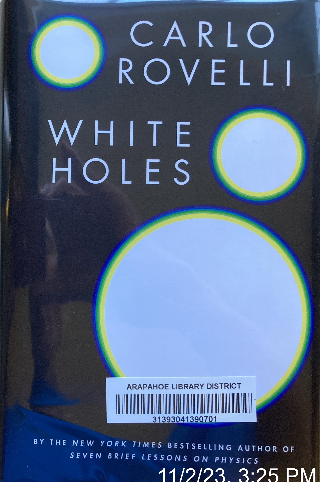-
Carlo Rovelli, "White Holes"--- '자유의지'책 읽는 즐거움 2023. 11. 23. 06:41
.

Carlo Rovelli, "White Holes" (2023 in Italian, 2023 in English)
By Adam Frank, 10/31/2023
"Rovelli is unique among modern scientists who write for popular audiences in his ability to capture the purest essence of his science with both precision and lyricism" (위 서평에서). 그래서 Carlo Rovelli의 책을 읽는 것은 여러모로 즐겁다. 막 나온 이 책은, "Reality is Not What It Seems"에 이어, 내가 읽은 그의 책의 다섯 번째다.
"I do not know whether the idea that black holes end their long lives by becoming white holes is correct or not. It is the phenomenon that I have been studying for the past few years. It invokes the quantum nature of time and space, the coexistence of different perspectives, the reason for the difference between the past and the future. Exploring this idea is an ongoing adventure." -- Carlo Rovelli, 책 겉표지 안쪽에서.
Part One, Part Two에서 잘 설명하고 있는 White Hole -- "the same solution [of Einstein's equations] that describes a black hole, reversed in time" (p. 65) -- 의 아이디어도 흥미롭지만, 모두 141쪽인 이 책의 마지막 40쪽에 해당하는, Part Three의 내용 -- '자유의지'의 이해 등 -- 이 정작 놀랍다. 저자가 지난 몇 년 간의 연구를 통해 얻은 이해(understanding)다. 아래에 몇 구절 인용해 놓고, 천천히 좀 깊이 생각해 봐야겠다.(예약대기자를 위해, 도서관에서 빌린 이 책은 곧장 반납하려고 한다.)
p. 121
Traces,memories, observations are all irreversible phenomena.... For them to occur, it is enough that the three conditions I have listed are present: (1) there are systems in disequilibrium that (2) occasionally interact, and (3) the system that preserves the trace, the memory, the record must in turn remain away from equilibrium for a while.
The initial disequilibrium of the past is the reason the present has traces of the past. The formation of every trace is nothing other than an intermediate step toward equilibrium. If the present has traces of the past, it is due solely to the disequilibrium of that past.
p.122
It is not a direction intrinsic to time that makes the past knowable, determined: what we call the past is how things were arranged at one point in time. It is the disequilibrium of the past -- only that -- that gives rise to traces.
The reason we remember the past and not the future is entirely due to the fact that the universe was further from equilibrium at one point in the past than it is now.
pp. 125-127
The second phenomenon that seems to contradict the fundamental similarity of past and future, a phenomenon that concerns us even more than memory, is the fact that we can choose the future, but we cannot choose the past. We decide.
Making a decision can be a complex process.... "Making a decision" is the name that we give to this complicated process that takes place between our neurons before an action. There is nothing strange about this: the world is full of complicated processes. But there is a radical aspect in decisions: we can decide "freely." Whether at the end of a troubled evaluation, or intuitively and without thinking, it is we who decide spontaneously, in a way that cannot be anticipated. The world can evolve, following this free decision of ours, toward different futures.
A decision, as well, is an irreversible step toward equilibrium. The freedom of choice is real, but it regards the macroscopic description of what happens, not the microscopic one. It is the macro-story that branches. This is possible because different macro-futures are compatible with the same macro-past. And this, in turn, is possible precisely because many different micro-pasts correspond to the macro-past.
Freedom is ... real. But as Spinoza clarified in the seventeenth century, freedom is our way of designating the fact that we are not able to fully reconstruct what happens in the decision making, to predict what we will decide. Spinoza writes: "Men feel free, because they are aware of their choices and their wishes, but they ignore the causes that lead them to will and to choose, and do not give the slightest attention to these causes."
There are those, strangely, who are disturbed by this understanding of what freedom means. I think they are making a mistake. The old fisherman's mistake.
p. 130
A cause is an intervention that leaves a trace, a memory -- its effect. The relationd between cause and effect is a step toward the equilibrium of the world.
p. 131
It is because disequilibrium is so necessary to thinking that it is so natural to us to think of time as directional, and so difficult to accept the idea that the orientation of time is not fundamental. The time of our thinking is directional because our thinking is itself an irreversible phenomenon. Because we ourselves are irreversible phenomena. We are children of time.
'책 읽는 즐거움' 카테고리의 다른 글
Frédéric Gros, "A Philosophy of Walking" | 정현종, "어떤 적막" (0) 2023.12.01 유대인의 양심 Hannah Arendt -- "The Visionaries" by W. Eilenberger (0) 2023.11.24 Carlo Rovelli, "Reality Is Not What It Seems" (0) 2023.11.18 Arthur Koestler, "Thieves in the Night" (0) 2023.11.09 Barbara Kingsolver, "Unsheltered" (0) 2023.10.25